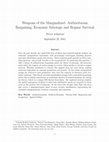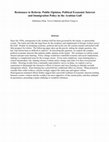Papers by Trevor Johnston

Reform of the Kafāla System: A Survey Experiment from Qatar
Immigration in the Arabian Gulf is governed by the kafāla (sponsorship) system, which provides th... more Immigration in the Arabian Gulf is governed by the kafāla (sponsorship) system, which provides the legal basis for the residency and employment of foreign workers across the region. Despite mounting economic, political and social costs, the system remains entrenched with little prospect for reform. The following paper takes up this puzzle, asking the simple question, why has vital reform been so difficult to achieve? In answering this question, we explore the complex political and economic interests that underlie public support for the kafāla system. Drawing on data from a nationally representative survey experiment in Qatar, we disentangle the effects of various interests on attitudes toward immigration reform. When primed to consider blue-collar workers, citizens strongly support the status quo and oppose reform. Heterogeneous treatment effects further suggest that a powerful coalition of economic interests (uniting business owners, workers and the wealthy) is the most supportive of the current policy, underpinning its persistence and representing a
major challenge to reform.

The Political Economy of Sabotage: Distributive Politics and Regime Stability in Rentier States
The resource-rich, rentier states of the Arabian Gulf are some of the most stable regimes in th... more The resource-rich, rentier states of the Arabian Gulf are some of the most stable regimes in the world. Since the Arab Spring, their continued robustness has only reinforced this view, leading many to conclude that these regimes have eliminated any real threat to their rule. In this paper, I challenge this conventional wisdom and explore an underlying and growing threat to these regimes: economic sabotage. From work stoppages and industrial strikes, to targeted protests and violent riots, sabotage can take any number of forms. By interrupting production, sabotage threatens the rentier system and these regimes’ longterm political stability. The conditions under which sabotage occurs, and its effects on distributive policy, is crucial to understanding the politics and stability of the Gulf today. To this end, I develop a game theoretic model of rentier distribution under the threat of sabotage. The model generates a series of predictions on when we should see sabotage, what form it takes, and how rulers may respond to these threats through distributive policies. Ultimately, the model suggests that however politically marginalized some groups may be, they are not powerless: with the threat of sabotage, even migrants can influence policymaking and extract distributive concessions.
Revolutionary movements depend on mass mobilization. To prevent revolt, autocrats can use domesti... more Revolutionary movements depend on mass mobilization. To prevent revolt, autocrats can use domestic and foreign policy instruments. We model the autocrat's policy choice with a focus on the coordination problem that underlies revolutionary mobilization. We show that the relationship between revolutionary threats and policy responses may be non-monotonic. Smaller threats may actually provide stronger incentives for autocrats to prevent mobilization, since policies are more cost-effective when threats are low. Furthermore, we show that domestic and foreign policies can serve as substitutes or complements.

Over the past decade, the small Gulf state of Qatar has targeted migrant workers, an otherwise ma... more Over the past decade, the small Gulf state of Qatar has targeted migrant workers, an otherwise marginalized community, with increasingly extravagant spending projects and other distributive goods and services. These targeted goods present us with a puzzling question: why provide benefits to the marginalized? In answering this question, I o↵er a theory of authoritarian bargaining under the threat of sabotage. All autocrats must solicit the support of various groups in society, whose loyalty is crucial to regime survival. Whether purchased or coerced, this support does not come cheap, making autocrats dependent on constant production and growth. To the extent marginalized groups are critical to such production, they have the capacity to threaten costly economic sabotage. This threat provides marginalized groups with a potential bargaining power that is simply nonexistent in traditional theories of authoritarianism. In testing my theory, I draw on a unique GIS dataset from Qatar. My empirical strategy exploits the spatial segregation of Qatar to show how distributive goods are targeted to those areas at the greatest risk of sabotage. At the same time though, these high risk areas also receive a disproportionate share of state security installations, representing the potential complementarity between cooptation and repression. for helpful comments. All remaining errors are my own.

Since the 1950s, immigration in the Arabian Gulf has been governed by the kafala, or sponsorship ... more Since the 1950s, immigration in the Arabian Gulf has been governed by the kafala, or sponsorship system. The kafala provides the legal basis for the residency and employment of foreign workers across the Gulf. Despite its mounting economic, political and social cost, the system remains entrenched with little prospect for reform. The following paper takes up this puzzle, asking the simple question, why has vital reform been so difficult to achieve? In answering this question, we explore the complex political economic interests that underlie public opinion on the kafala. The resistance to reform is part interest and part issue-framing. Policy change would have manifold economic and social implications, making it a complicated issue for the average citizen. Given such complexity, issue-framing plays a critical intermediary role, helping citizens evaluate policy change and relate it to their own personal welfare. Drawing on data from a nationally representative survey in Qatar, we exploit a survey experiment to disentangle the interactive effects of interest and issue-framing on attitudes towards immigration reform. Issue-framing has a powerful but conditional effect on citizens. When primed to consider blue-collar workers, citizens strongly support the status quo and oppose reform. Heterogeneous treatment effects further suggest that a powerful coalition of economic interests (uniting business owners, workers and the wealthy) are most supportive of the current policy and thus underpin its persistence, presenting a major challenge to would-be reformers.
In this project, we model revolutionary activism on networks. Revolutionary fervor spreads throug... more In this project, we model revolutionary activism on networks. Revolutionary fervor spreads through the network like a contagion, but depends on the revolutionary thresholds and grievance levels of each node. We provide for nodal removal and rewiring to better capture the underlying dynamics that drive revolutions and endogenize regime legitimacy. Our model deviates from existing work insofar as we arrange actors along a continuum, allowing for counter-revolutionaries and police to eventually be coopted into the revolution. This is a crucial condition for successful revolutions, which is too often gainsaid. Ultimately, we find that initial network structure has a negligible effect on long-run dynamics and that under many parameter settings the system equilibrates to a steady state after a transitory period and phase transition.
Papers and Chapters by Trevor Johnston

Cizens’ attitudes towards migrant workers in Qatar
Public attitudes play a critical role in shaping policies towards immigration and the status of m... more Public attitudes play a critical role in shaping policies towards immigration and the status of migrant workers. Facing growing pressure from international human rights organizations, media and other groups, the Gulf Cooperation Council states have begun efforts to reform the current kafala system, which prevails throughout the region. Yet despite these efforts, relatively little is known about what citizens actually think of this policy, let alone their more general attitudes towards foreign workers. In the following paper, we explore this question and focus on the case of Qatar. Recently, the Qatari government promised to reform their sponsorship system in 2015. Whether this reform succeeds will depend on public attitudes towards this new policy and how citizens perceive the role of foreign workers in the country. Drawing on data from a nationally representative survey in Qatar, we use a split sample technique to better disentangle citizens’ varying attitudes towards blue-collar and white collar workers. The survey results suggest that Qatari citizens are ambivalent about foreign workers’ contributions and overall impact on their country. While they value foreign workers’ positive contribution to the development of their country in general, they have concerns about this population’s impact on economic and health resources. Ultimately, most citizens would prefer to maintain the sponsorship system, or kafala, as it is right now.











Uploads
Papers by Trevor Johnston
major challenge to reform.
Papers and Chapters by Trevor Johnston
major challenge to reform.